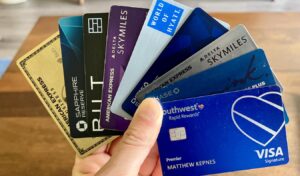Can you really live without a credit card in the U.S.?
Living in the U.S. without a credit card may seem unrealistic, especially in a society where credit scores impact everything from renting an apartment to getting a job. Yet, some people choose to go without one, relying solely on debit cards, cash, and alternative financial tools.
But is this approach practical? While avoiding credit can reduce debt risks, it also limits financial flexibility and the ability to build credit history. Before deciding, it’s crucial to weigh the advantages and disadvantages of living without a credit card in the U.S.
The pros of living without a credit card

Avoiding debt and overspending
One of the biggest advantages of living without a credit card is avoiding the debt trap. Credit cards make it easy to spend money you don’t have, leading to high-interest charges and financial stress. By using cash or debit cards, you can only spend what you have, promoting better money management.
Without the temptation of credit, impulse purchases become less frequent. Many people find that using cash or debit forces them to be more mindful of their expenses, leading to improved budgeting and financial discipline.
No interest charges or fees
Credit cards often come with hidden costs, including annual fees, late payment penalties, and high-interest rates. By relying on alternative payment methods, you eliminate these unnecessary expenses. Over time, this can lead to significant savings and more control over your personal finances.
For those who struggle with on-time payments, avoiding credit cards can also reduce stress. Without monthly statements and minimum payments to worry about, financial management becomes simpler and more predictable.
Lower risk of identity theft
Credit card fraud is a growing concern, with data breaches and cybercrime becoming more sophisticated. By avoiding credit cards, you reduce your exposure to potential fraud. While debit cards also carry some risk, they do not accumulate debt if compromised, and cash transactions eliminate digital threats entirely.
Using prepaid debit cards or digital wallets with secure encryption can further enhance security. These alternatives provide convenience without the vulnerabilities associated with traditional credit cards.
The cons of living without a credit card
Limited credit history and score
In the U.S., credit history plays a major role in financial opportunities. Without a credit card, building a strong credit score becomes more difficult. This can impact your ability to secure a mortgage, rent an apartment, or even get approved for certain jobs.
Although there are alternative ways to build credit, such as credit-builder loans or secured cards, they often require more effort. Responsible credit card usage remains one of the easiest ways to establish a solid financial reputation.
Challenges in emergency situations
Credit cards provide a financial safety net in emergencies. If an unexpected expense arises, such as medical bills or urgent car repairs, having a credit card can be a lifesaver. Without one, you may need to rely on savings or borrow from friends and family, which isn’t always practical.
While some people use emergency funds to cover unexpected costs, not everyone has the discipline or resources to maintain one. A credit card can act as a backup plan, providing temporary financial relief when needed.
Difficulty with online and travel transactions
Many online purchases, hotel bookings, and car rentals require a credit card. While some companies accept debit cards, they often place large holds on funds, restricting access to your money. This can be inconvenient and frustrating, especially for frequent travelers.
Credit cards also offer fraud protection and travel benefits that debit cards do not. Many provide travel insurance, rental car coverage, and rewards programs, making them valuable tools for those who travel frequently or shop online.
How to live without a credit card successfully
Use debit cards and digital payment methods
A debit card linked to a checking account allows cashless transactions while keeping spending within your means. Many banks also offer fraud protection and security features similar to credit cards. Additionally, digital payment platforms like PayPal, Venmo, and Apple Pay provide secure alternatives for online and in-person purchases.
Prepaid debit cards can also be useful for budgeting. By loading only a specific amount of money onto the card, you can control spending without the risk of debt accumulation.
Build credit through alternative methods
If you choose to live without a credit card but still want to build credit, consider options like credit-builder loans, rent reporting services, or secured loans. Some banks offer programs that report your utility payments to credit bureaus, helping you establish a positive credit history without a traditional credit card.
Another option is a secured credit card, which requires a cash deposit as collateral. While technically a credit card, it operates differently and can be a useful tool for credit-building without overspending risks.
Maintain an emergency fund
Without a credit card as a backup, having a well-funded emergency savings account is crucial. Financial experts recommend setting aside three to six months’ worth of living expenses in a high-yield savings account. This ensures you have access to funds when unexpected costs arise.
In addition to a savings account, consider having a financial plan that includes insurance coverage for medical emergencies, car repairs, and other potential expenses. This proactive approach reduces reliance on credit while maintaining financial stability.
Another key aspect is having multiple sources of income. If you rely on a single paycheck, financial disruptions can be harder to manage without a credit card as a safety net. Exploring side hustles, freelance work, or passive income sources can strengthen your financial resilience. The more diversified your income, the easier it becomes to handle unexpected expenses without turning to credit.
Is living without a credit card in the U.S. feasible?
While it is entirely possible to live without a credit card in the U.S., it requires careful financial planning. The decision comes down to personal financial habits, goals, and lifestyle needs. For those who struggle with debt, going credit-free can provide financial freedom and reduce stress. However, the trade-offs include limited credit-building opportunities and potential inconveniences.
Ultimately, the best approach depends on balancing financial discipline with strategic alternatives. Whether you choose to use credit cards responsibly or avoid them entirely, having a solid financial plan is key to long-term success.
Graduated and master's student in History. Fanatic of books and series. Editor since 2023.




